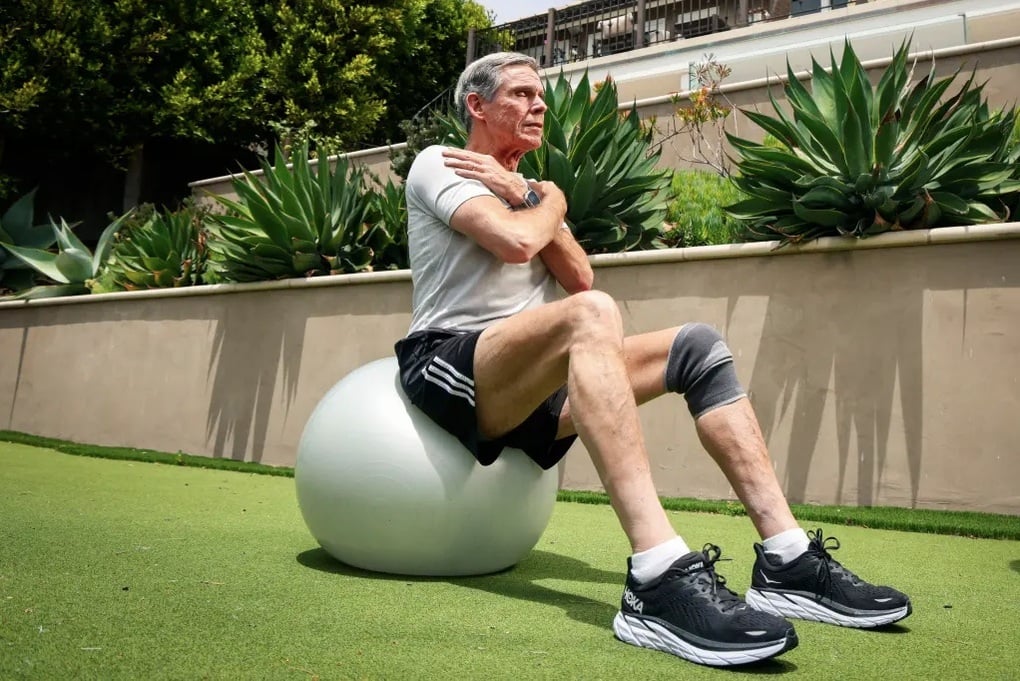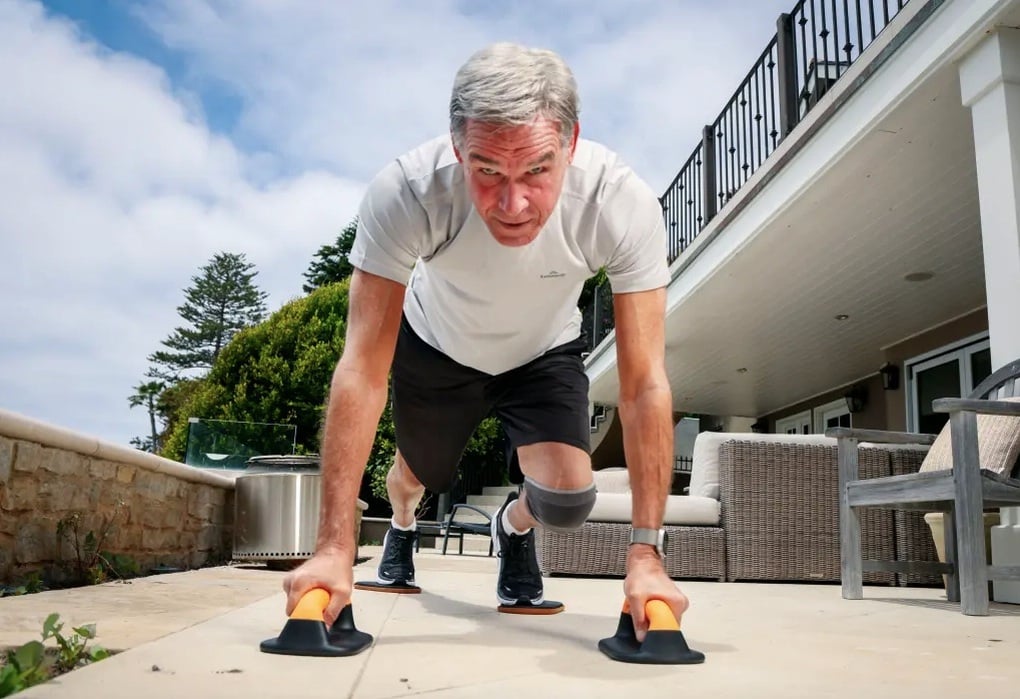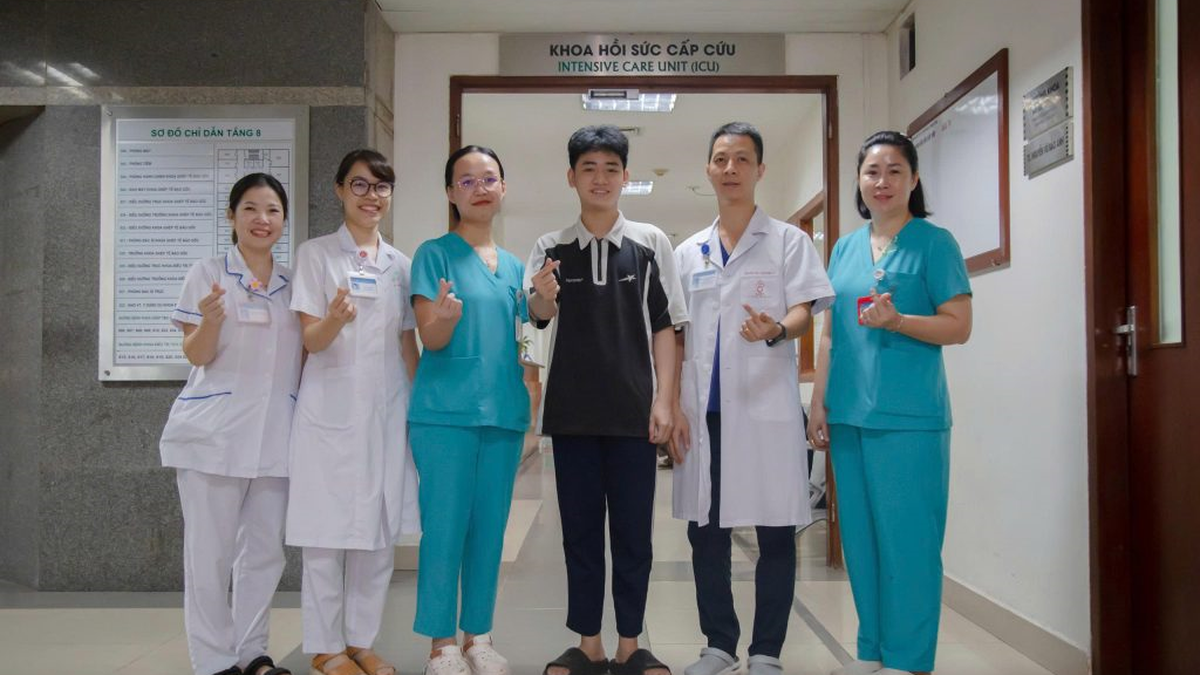Seventeen years ago, Dr. Eric Topol set out to explore why some people age so well, while others do not. At 53, Topol took healthy aging to be a deep and personal scientific interest.
“Super-aging” is what Dr. Topol calls the roughly 1,400 healthy adults aged 80 and older whom he spent more than six years studying for his new book, “Super-aging: An Evidence-Based Approach to Longevity.”
When he first started the project, he suspected that genetics was the main reason these people lived into old age without any signs of chronic disease.
But he turned out to be wrong. These older people had very little in common genetically, which meant their longevity depended on lifestyle factors.
After further research, Topol came to a simple conclusion.
Dr. Eric Topol performs sit-ups or crunches on an exercise ball (Photo: Getty images).
“Of all the things we know, the one that stands out the most is exercise. In fact, it’s the only intervention in humans that has been shown to slow down the systemic aging clock, meaning it appears to change the rate at which we age,” Topol told The Washington Post .
“Of course, other lifestyle factors, like diet and social interaction, are incredibly important. But if there is one thing that has the most evidence for healthy aging, it is exercise,” he stresses.
So what exercise helps you live longer?
Previous research has shown that the recommended 150 minutes of moderate-intensity physical activity, which can include gardening, dancing, yoga, mowing the lawn, water aerobics and brisk walking, can significantly extend your life.
Exercise is a long-standing pillar of health, and for good reason. It reduces the risk of heart disease, keeps the brain active and fights cognitive decline, and reduces the risk of falls and age-related frailty.
“Exercise is incredible. It works on all three age-related diseases,” Topol said of cancer, heart disease and dementia, emphasizing that it is the most effective way to maintain a healthy immune system and fight disease.
That's why for decades, Dr. Topol has recommended aerobic exercise instead of strength training to his patients.
However, since studying longevity, he recommends adding strength training, including grip strength training and resistance training, to combat age-related muscle and bone loss and improve balance and mobility.
These exercises have a special correlation with healthy aging.
This view is consistent with other studies showing that strength training not only increases muscle mass but also enhances mental acuity, increases bone density and improves balance, which is especially beneficial for older adults at risk of serious injury from falls.
Research shows that strength training not only builds muscle, but also boosts mental acuity, improves bone density and improves balance (Photo: Getty images).
A recent study even showed that strength training is the best type of exercise to combat insomnia in older adults.
And a Harvard study found that middle-aged men who could do at least 20 push-ups had a significantly lower risk of heart disease.
Dr. Florence Comite, a precision medicine physician in Manhattan, considers muscle building the “fountain of youth,” emphasizing its role in controlling blood sugar and combating age-related muscle loss.
Overall, it seems like lifting a few dumbbells — or using your own body weight — can be very effective.
And the best news is that you don’t have to join an expensive gym or commit to a specific time frame each day. Studies show that just 30 to 60 minutes of resistance training per week can reduce your risk of premature death from all causes by 10 to 20 percent.
Topol himself does strength training for an hour, three times or thirty minutes, four or five times a week combining classic exercises like crunches, sit-ups, squats and planks.
"I'm healthier and stronger than I ever remembered being, just from doing this for over a year now," Topol told Today .
Mediterranean Diet
According to this doctor, the Mediterranean diet is the standard diet in many green zones around the world . A diet that includes whole foods, colorful fruits and vegetables, lean meats, whole grains, olive oil and little dairy is the diet that has the best protective effect against chronic diseases.
Research shows this diet is linked to improved bone, heart and brain health and a reduced risk of cancer.
“This is the best-supported diet we have. It's been proven time and time again to work,” Topol told Fortune .
This diet also focuses on ultra-processed foods, which when consumed regularly can increase the risk of chronic diseases like heart disease and stroke, and lead to premature death.
Apply preventive screening
Age-related diseases typically develop over a 20-year period. Topol said many people are unaware of their risk for age-related diseases and therefore do not make lifestyle changes that could help reduce those risks.
“How can we predict with great reliability when, who and what diseases we will be at risk of getting so that we can prevent them in the first place? For that, more preventive screening is needed,” he asked.
Topol hopes that advanced medicine and technology will help quantify people’s risk so they can take control earlier. If someone realizes they are at higher risk for Alzheimer’s, using a brain clock or a blood test that detects amyloid plaques associated with the disease, they may be more inclined to adopt a healthier lifestyle.
Source: https://dantri.com.vn/suc-khoe/bi-mat-ve-bai-tap-cua-nhung-nguoi-sieu-lao-hoa-de-song-tho-20250529064119243.htm





































































































Comment (0)